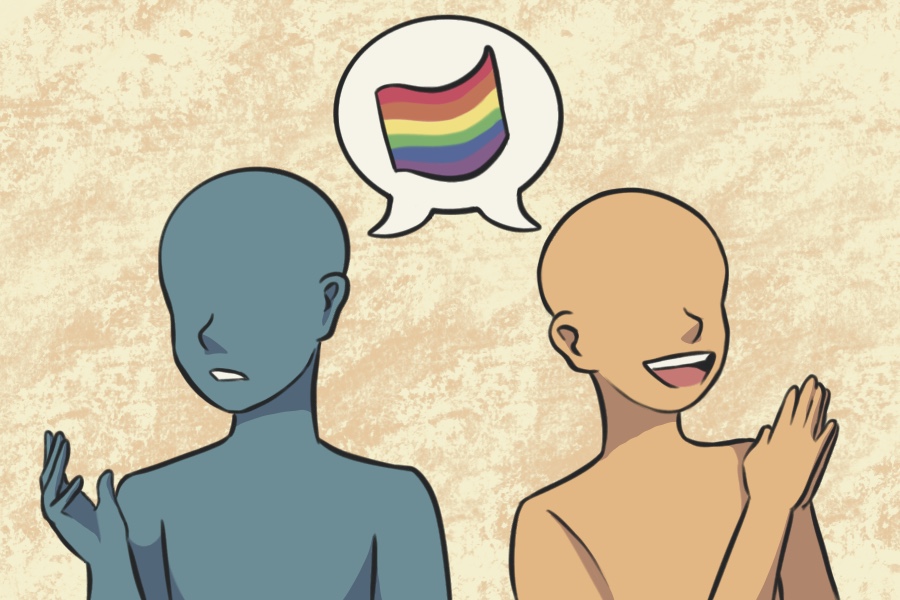UI students speak about coming out
April 5, 2023
For many LGBTQIA+ individuals, coming out is an intimidating and important task. Conversations around coming out are prevalent and have been a popular theme for much of history, but how has coming out changed now in comparison to years past?
Mateusz Brak, senior in ACES, is a child of Roman Catholic Polish immigrants. He said the signs that he might be gay go back as early as second grade, but Brak’s family wasn’t the type to be highly supportive of him.
So, when it came time to come out to his parents, he couldn’t bring himself to do so. In the end, it was his parents who made him say it out loud.
“They were putting it together,” Brak said. “They sat me down in the living room and said, ‘you have to say it.’”
Brak had delayed telling them for as long as he could, but he said it felt wrong to hide something so important from his parents when many of his friends already knew.
Get The Daily Illini in your inbox!
Brak said Polish communities generally hold conservative views on queerness, and he felt like coming out to his parents would let them down. “Jestem gejem,” he told them in Polish. “I’m gay.”
His parents took it well, all things considered. Still, Brak’s relationship with his parents felt somewhat distant the following years while they navigated how to best support their son along a journey they didn’t have any experience in. Throughout, they valued his honesty and made sure he knew he was loved no matter what.
The reaction of Brak’s parents highlights the steady incline of acceptance of LGBTQIA+ communities in the United States. Widespread tolerance of gay and lesbian people in this country has reached an all-time high at 62%, according to Gallup’s 2022 Mood of the Nation poll.
Stories like Brak’s were much less common just 10 years ago. In 2012, Pew Research Center reported that only 48% of Americans were in favor of legalizing gay marriage; four years prior, only 39% supported it.
Allie Gilbert, a 2022 graduate from the College of Education, came out in 2014 as a freshman in high school. She struggled a lot in high school and felt that many of her peers were still unsure of the gay community.
“I was a baby,” Gilbert said. “People weren’t the most accepting at the time and it was a lot harder than I expected it to be. I didn’t really know what coming out as queer looked like for me, so I was still navigating that. The first year or two was hard.”
Her parents didn’t respond well at first. They were confused and thought she was going through a phase.
“I felt very closeted in high school,” Gilbert said. “I couldn’t really say much, and I couldn’t really express who I was. It was hard to be at home and have questions about who I was. I couldn’t really explore that because my parents weren’t accepting.”
She says her parents have grown a lot since then and Gilbert said she has a much better relationship with them now. Gilbert attributes a lot of this apprehension to the atmosphere at the time. They weren’t expecting it. Ever since she came out at 14, she’s had to continue to talk with them about it and show them that it’s not going away.
Michael Kraft, senior in ACES, struggled with his identity up until college. Like Brak, Kraft also came from a religious background and grew up believing that homosexuality was a sin.
“As a religious person, it’s a constant battle between beliefs and your feelings because I’m not going to be able to change this at all,” Kraft said.
He didn’t know anyone else in his community who was queer and had no idea how people would take it, but everyone was very supportive when Kraft came out. He was surprised by some of the conservative people in his circle whom he thought he was going to have to end relationships with. He felt a big part of this is the increase in tolerance for people a part of the LGBTQIA+ community.
Despite the promising reaction to his coming out among family and friends, Kraft still feels uncomfortable at times in public situations. He’s had people scoff and yell at him when he is with his partner in public.
“We’re getting better,” Kraft said. “But it’s still very uncomfortable to even walk down Green Street sometimes holding the hand of another partner. It’s disheartening.”
Gilbert, who is now a fourth-grade teacher in Nashville, Tennessee, tries to tackle some of society’s lasting homophobia in her classroom. At the beginning of the school year, Gilbert said there was an issue in which a student was calling other classmates gay in a derogatory way.
“I put that down really quick,” she said. “I had a long conversation with him about why you can’t say that and what it actually means to be gay. That’s kind of how I approach it. They don’t need to know that I’m gay, but they know that I support it. And they know that if someone’s going to call someone gay in a derogatory way, I’m going to give them a consequence for that.”
Currently, she has three students who have come out to her.
“I’m proud because my kids don’t care that there are a couple of girls who like girls,” Gilbert said. “I think as time has gone on, the amount of people that come out as gay has increased a lot. So, it’s just more normalized now than it was when we were in high school. And the more people, like gay people, that parents see out in the world, (the more they realize) they’re just like everyone else.”







